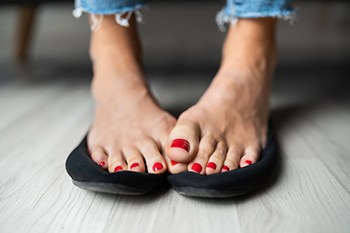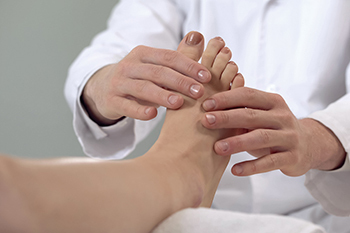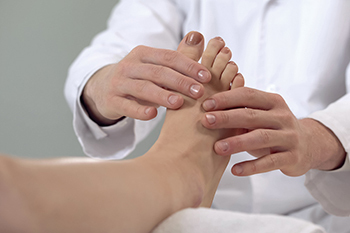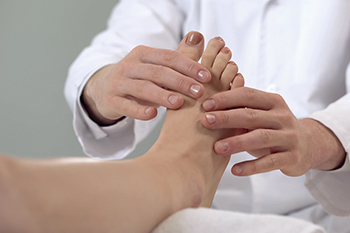Connect With Us
Blog
Items filtered by date: September 2022
Why Are My Feet Sweating?

Hyperhidrosis is an excessive sweating that can affect the feet and other parts of the body. The medical terms are polyhidrosis and sudorrhea. This ailment is not life-threatening but can be uncomfortable and embarrassing. Many people who have this condition often notice signs in their teenage years, which can develop reasons such as obesity, diabetes, or a thyroid disorder. A common symptom that is associated with this ailment is profuse sweating on the soles of the feet that can often soak through the socks and shoes. The skin on the feet may ultimately be affected, and people who have hyperhidrosis may choose to refrain from having physical contact. If you have this condition, a podiatrist will be able to provide a proper diagnosis and guide you toward the correct treatment options. If more information is desired, it is strongly suggested that this type of doctor is contacted so relief can be found.
If you are suffering from hyperhidrosis contact Dr. Richard Silverstein of Union Foot Care. Our doctor can provide the care you need to attend to all of your foot and ankle needs.
Hyperhidrosis of the Feet
Hyperhidrosis is a rare disorder that can cause people to have excessive sweating of their feet. This can usually occur all on its own without rigorous activity involved. People who suffer from hyperhidrosis may also experience sweaty palms.
Although it is said that sweating is a healthy process meant to cool down the body temperature and to maintain a proper internal temperature, hyperhidrosis may prove to be a huge hindrance on a person’s everyday life.
Plantar hyperhidrosis is considered to be the main form of hyperhidrosis. Secondary hyperhidrosis can refer to sweating that occurs in areas other than the feet or hands and armpits. Often this may be a sign of it being related to another medical condition such as menopause, hyperthyroidism and even Parkinson’s disease.
In order to alleviate this condition, it is important to see your doctor so that they may prescribe the necessary medications so that you can begin to live a normal life again. If this is left untreated, it is said that it will persist throughout an individual’s life.
A last resort approach would be surgery, but it is best to speak with your doctor to find out what may be the best treatment for you.
If you have any questions please feel free to contact our office located in Havre de Grace, MD . We offer the newest diagnostic and treatment technologies for all your foot and ankle needs.
Effective Methods That May Help to Prevent Falling

Research has indicated that approximately 25% of people who are over 65 years old will experience a fall. This can result in a serious foot injury, such as a broken foot or ankle. People who have fallen may develop a fear of falling, which may lead to becoming inactive. There are methods that can be implemented that may help to reduce falling. These include having regular physical and eye examinations, and this is useful in updating existing medication and eyeglasses. Additionally, it is beneficial to install grab bars in the shower and toilet area, and it is safer while bathing when a bath mat is used. Many people improve the lighting in the household, and find it helpful to remove worn rugs that may be considered a tripping hazard. The feet can be affected by falling, and it is suggested that you consult with a podiatrist who can help you if that should happen
Preventing falls among the elderly is very important. If you are older and have fallen or fear that you are prone to falling, consult with Dr. Richard Silverstein from Union Foot Care. Our doctor will assess your condition and provide you with quality advice and care.
Every 11 seconds, an elderly American is being treated in an emergency room for a fall related injury. Falls are the leading cause of head and hip injuries for those 65 and older. Due to decreases in strength, balance, senses, and lack of awareness, elderly persons are very susceptible to falling. Thankfully, there are a number of things older persons can do to prevent falls.
How to Prevent Falls
Some effective methods that older persons can do to prevent falls include:
- Enrolling in strength and balance exercise program to increase balance and strength
- Periodically having your sight and hearing checked
- Discuss any medications you have with a doctor to see if it increases the risk of falling
- Clearing the house of falling hazards and installing devices like grab bars and railings
- Utilizing a walker or cane
- Wearing shoes that provide good support and cushioning
- Talking to family members about falling and increasing awareness
Falling can be a traumatic and embarrassing experience for elderly persons; this can make them less willing to leave the house, and less willing to talk to someone about their fears of falling. Doing such things, however, will increase the likelihood of tripping or losing one’s balance. Knowing the causes of falling and how to prevent them is the best way to mitigate the risk of serious injury.
If you have any questions, please feel free to contact our office located in Havre de Grace, MD . We offer the newest diagnostic and treatment technologies for all your foot care needs.
Exercises That May Help Children With Flat Feet

When the arch of the foot is not fully developed, it is known as flat feet. The medical term for this ailment is called pes planus and it affects most babies when they are born. The arch will fully develop in most people in their teenage years and there are specific exercises and stretches that can be performed which may help with existing discomfort. Have your child stand on one foot as this is an effective method of using the small muscles inside of the foot and around the ankles as balance is maintained. A good exercise that can strengthen the toes is done when your child picks up marbles that are on the floor with their feet as this can help build up the arch. Ask your child to walk on a curb. This is an effective way for them to learn how to balance on narrow surfaces and will strengthen the ankle and arch and may help to gradually develop the foot. If you would like additional information about how to live with flat feet and possible ways to strengthen the arch, please confer with a podiatrist.
Flatfoot is a condition many people suffer from. If you have flat feet, contact Dr. Richard Silverstein from Union Foot Care. Our doctor will treat your foot and ankle needs.
What Are Flat Feet?
Flatfoot is a condition in which the arch of the foot is depressed and the sole of the foot is almost completely in contact with the ground. About 20-30% of the population generally has flat feet because their arches never formed during growth.
Conditions & Problems:
Having flat feet makes it difficult to run or walk because of the stress placed on the ankles.
Alignment – The general alignment of your legs can be disrupted, because the ankles move inward which can cause major discomfort.
Knees – If you have complications with your knees, flat feet can be a contributor to arthritis in that area.
Symptoms
- Pain around the heel or arch area
- Trouble standing on the tip toe
- Swelling around the inside of the ankle
- Flat look to one or both feet
- Having your shoes feel uneven when worn
Treatment
If you are experiencing pain and stress on the foot you may weaken the posterior tibial tendon, which runs around the inside of the ankle.
If you have any questions please feel free to contact our office located in Havre de Grace, MD . We offer the newest diagnostic and treatment technologies for all your foot and ankle needs.
Are Bunions Affecting Your Everyday Life?
Uncomfortable Plantar Warts

Plantar warts are found on the bottom of the feet, and can be very painful. The majority of warts grow outward, but plantar warts grow inward as a result of standing and walking for most of the day. The medical name for this type of wart is a verruca, and is connected with the human papillomavirus (HPV). The wart appears as a small, thickened area of skin on the bottom of the foot, and many times will have tiny black dots in the center. The virus can enter the body through small cracks in the skin of the feet, and generally lives in warm and moist environments. These can include public swimming pools, shower room floors, and locker rooms. It is advised that appropriate shoes, like flip flops or water shoes, are worn while in these areas. Plantar warts can be extremely uncomfortable, and many patients seek immediate relief. If you are afflicted with a plantar wart, please consult with a podiatrist who can discuss several effective treatment options with you.
Plantar warts can be very uncomfortable. If you need your feet checked, contact Dr. Richard Silverstein from Union Foot Care. Our doctor will assist you with all of your foot and ankle needs.
About Plantar Warts
Plantar warts are the result of HPV, or human papillomavirus, getting into open wounds on the feet. They are mostly found on the heels or balls of the feet.
While plantar warts are generally harmless, those experiencing excessive pain or those suffering from diabetes or a compromised immune system require immediate medical care. Plantar warts are easily diagnosed, usually through scraping off a bit of rough skin or by getting a biopsy.
Symptoms
- Lesions on the bottom of your feet, usually rough and grainy
- Hard or thick callused spots
- Wart seeds, which are small clotted blood vessels that look like little black spots
- Pain, discomfort, or tenderness of your feet when walking or standing
Treatment
- Freezing
- Electric tool removal
- Laser Treatment
- Topical Creams (prescription only)
- Over-the-counter medications
To help prevent developing plantar warts, avoid walking barefoot over abrasive surfaces that can cause cuts or wounds for HPV to get into. Avoiding direct contact with other warts, as well as not picking or rubbing existing warts, can help prevent the further spread of plantar warts. However, if you think you have developed plantar warts, speak to your podiatrist. He or she can diagnose the warts on your feet and recommend the appropriate treatment options.
If you have any questions please feel free to contact our office located in Havre de Grace, MD . We offer the newest diagnostic and treatment technologies for all your foot and ankle needs.
Blog Archives
- July 2024
- June 2024
- May 2024
- April 2024
- March 2024
- February 2024
- January 2024
- December 2023
- November 2023
- October 2023
- September 2023
- August 2023
- July 2023
- June 2023
- May 2023
- April 2023
- March 2023
- February 2023
- January 2023
- December 2022
- November 2022
- October 2022
- September 2022
- August 2022
- July 2022
- June 2022
- May 2022
- April 2022
- March 2022
- February 2022
- January 2022
- December 2021
- November 2021
- October 2021
- September 2021
- August 2021
- July 2021
- June 2021
- May 2021
- April 2021
- March 2021
- February 2021
- January 2021
- December 2020
- November 2020
- October 2020
- September 2020
- August 2020
- July 2020
- June 2020
- May 2020
- April 2020
- March 2020
- February 2020
- January 2020
- December 2019
- November 2019
- October 2019
- September 2019
- August 2019
- July 2019
- June 2019
- May 2019
- April 2019
- March 2019
- February 2019
- January 2019
- December 2018
- November 2018
- October 2018
- September 2018
- August 2018
- July 2018
- June 2018
- May 2018
- April 2018
- March 2018
- February 2018
- January 2018
- December 2017
- November 2017
- October 2017
- September 2017
- August 2017
- July 2017
- June 2017
- May 2017
- April 2017
- March 2017
- February 2017
- January 2017
- December 2016
- November 2016
- October 2016
- September 2016
- August 2016
- July 2016
- June 2016
- May 2016

